There can be fewer places on earth that can be tougher to grow up in than the Caucasus.
A mountainous region that straddles the southernmost tip of Russia, it is home to a staggeringly diverse mixture of different ethnicities and linguistic groups that for centuries have battled to protect their culture and identity in the face of foreign control and occupation. Generations have grown up on its rugged steppes knowing nothing but conflict.
So it is perhaps unsurprising that the people of the region have developed an indomitable, warlike reputation that inspired the literary works of the great Russian writers Pushkin and Tolstoy: and continues to beguile outside observers to this day.
However, in the turbulent years following the break-up of the Soviet Union, the aura of romanticism faded into oblivion. The region became a byword for political instability, corruption and terrorism among others – as well as being routinely listed as one of the most dangerous places on earth.
The Caucasus man went from being the noble savage of nineteenth century Russian literature to being an object of suspicion, disdain and fear.
There is, however, one domain in the modern world that remains indisputably his, where the noble warrior spirit survives, allowing him to retain a semblance of respect among his peers: combat sports.
As glib as it may sound, it is impossible to ignore the disproportionately high number of contemporary world class combat athletes heralding from the Caucasus; in MMA, wrestling and boxing.
One of the standard-bearers for this tradition is the current IBF and WBA cruiserweight World champion, Murat Gassiev.
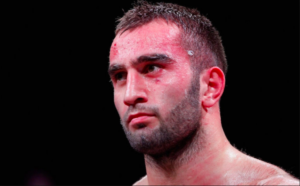
This Saturday in Moscow, Russia, Gassiev will seek to make boxing history when he takes on WBC and WBO counterpart Oleksandr Usyk of Ukraine in the eagerly-anticipated final of the World Boxing Super Series (WBSS) cruiserweight tournament.
The bout promises to be one of the best match-ups of the year, pitting the 200lbs division’s consensus top two fighters against each other, with all four title belts at stake for the first time in cruiserweight history as well as the inaugural Muhammad Ali Trophy.
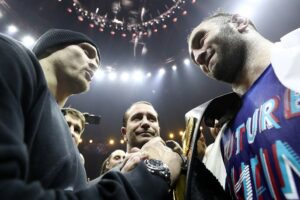
Gassiev has adopted the moniker of ‘Iron’ due to his prodigious strength and durability, but also to his membership of the Iron ethnic group; a subgroup of the Ossetian people who largely reside in the Republic of North Ossetia-Alania, which forms part of the Russian Federation.
He was born and grew up in the Republic’s capital, Vladikavkaz (which literally translates, appropriately, as ‘ruler of the Caucasus’), a chapter of life which he briefly alluded to when asked about his favourite way of training.
“I love training, I love boxing. I put all my time, all my heart in this sport. My favourite training is sparring. I can spar every day for many, many rounds. I have liked sparring since I was young and went to a lot of street fights.”
At only twenty-four-years-of-age, coupled with a limited amateur career consisting of only 25 fights, Gassiev is still a relative-baby in boxing terms.
In contrast, his opponent in the WBSS final, Usyk (who is seven years his senior) enjoyed an extensive and glittering amateur career, during which he captured gold medals at the 2008 European Championships, 2011 World Championships and, most notably, at the 2012 Olympic Games.
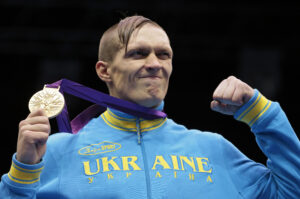
Usyk began the tournament as the number one seed and the odds-on favourite among the bookmakers. Yet, ever since Gassiev booked his place in the final, the odds have narrowed to the point that it is now almost impossible to split the two.
To use boxing parlance: this is a true 50:50 fight.
It was – without a shadow of doubt – the semi-final performances of the two that brought us to this point.
Usyk, who had hitherto looked flawless in the professional ranks, barely losing a round en route to a record of 13-0 and the WBO crown, was pushed all the way by Latvian WBC champion Mairis Briedis – eking out a majority decision victory on cards of 114-114 and 115-113 twice.
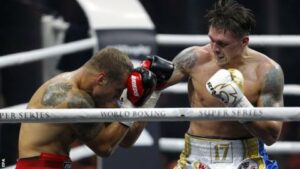
Gassiev was thought to have a tough out on his hands against skilful boxer-puncher Yunier Dorticos. A product of Cuba’s famed amateur boxing system, Dorticos had racked up an eye-popping 21 knockouts from 22 wins; including a highlight reel stoppage of Gassiev’s countryman and feared fellow knockout artist, Dmitry Kudryashov, in the quarter-final.
In the best performance of his career to date, Gassiev weathered an early storm to outbox his powerful opponent, breaking him down over the course of the fight, before finishing him off in a dramatic final round.
In a pulsating final three minutes, Gassiev sent Dorticos to the canvas three times before the referee called a halt to the ‘Fight of the Year’ candidate.
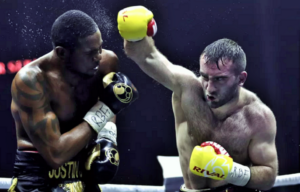
Naturally, Gassiev has taken a great deal of pride in this victory and accredits it as a vital learning experience in his boxing journey.
“The fight against Dorticos was tough for me. He is a very strong guy with a strong mentality and a lot of heart. A real warrior who never gives up. So I was excited about the victory.”
What could account for such phenomenal progress in such a short space of time? In Gassiev’s corner stands one Abel Sanchez.
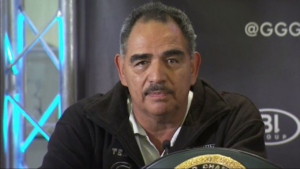
Sanchez – the renowned trainer of middleweight champion Gennady Golovkin and formerly of hall-of-famer Terry Norris – plies his trade out of the famous ‘Summit’ gym in Big Bear, California.
It was Sanchez who devised the game-plan which Gassiev followed and implemented to perfection against Dorticos, and he who has expertly honed the ring-craft of his young charge. In addition to Sanchez’s tutelage, the presence of the likes of Golovkin, who Gassiev now counts as a friend and mentor, has enriched the young champion’s training camp experience.
“I love my life in Big Bear. I have the best coach in the world and great friends. In my 24 years of living, right now is the best moment in my life.”
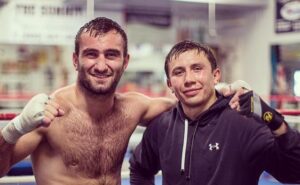
There are of course certain qualities which benefit the professional boxer but cannot be taught.
In Gassiev’s case, he possesses the kind of God-given, earth-shattering power in his fists which is liable to do damage even if he does not catch you clean: and if he does catch you clean… then good luck with staying up.
Jordan Shimmell found out the hard way, after being rendered unconscious on the canvas for two minutes courtesy of a Gassiev left hook to the head that seemed to rob him of his soul.
Former WBC World cruiserweight champion Krzysztof Wlodarcyk who was left hunched over in agony on his knees by a pulverising body shot.
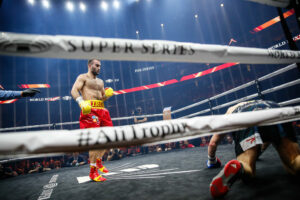
As befitting Gassiev’s alias, he is also in possession of a cast-iron chin, having taken the best shots of punchers such as Denis Lebedev, Wlodarczyk and Dorticos without flinching.
Moreover, he has the burning ambition, drive and work ethnic to succeed in the toughest of professions.
“I think for any sportsman discipline is the most important. Discipline in training, food, sleep. And you need to have a dream. For me, the dream is to become the best fighter in the world.”
Usyk is, however, an entirely different proposition to the aforementioned names; arguably the most well-rounded fighter in the cruiserweight division.
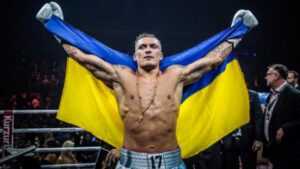
Despite being tested by Briedis, an excellent fighter in his own right, there is no-one in the division who can match Usyk for pure boxing skill and technique. While not in the same punching power league as Gassiev, he certainly hits hard enough to gain the respect of his opponents at the weight.
Usyk’s silky defensive skills have meant that he has not eaten an abundance of shots thus far in his professional career, but on the occasions when his opponents have connected, he, like Gassiev, has taken it well.
When asked if he had been training on something special in preparation for Usyk, Gassiev was guarded, if not nonplussed.
“The training camp before the final has been the same as before my other fights.”
“My opponent is a southpaw so I have had different sparring partners and you have to do things a bit different tactically against a southpaw. But besides that nothing has changed.”
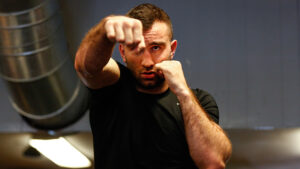
He was similarly objective when asked if Usyk would present his most difficult challenge as a professional. Gassiev was – and is – extraordinarily matter-of-fact when it comes to discussing his opponents – insisting that it is his own preparation and ability that matter most.
“No, I have been doing the same amount of running, physical exercising and sparring.”
“I am not thinking about what he is doing. I need to be Murat Gassiev and do my best… I am only thinking about myself, my skills and my condition. That’s it.”
One factor that would seem to gravitate in Gassiev’s favour is the location of the fight on home soil. The strained political relationship between the two men’s nations of Russia and Ukraine provides additional fuel for conspiracy theorists out there who would call foul play before the event even commences.

That said, it was hardly a hindrance for Usyk, who won his title away from home against Krzysztof Glowacki in the latter’s native Poland, and has defended it four times on the road since. In similar vein, Gassiev has played down the impact of the fight’s location.
“I would fight anywhere in the world, but it is a plus for my mother and brother that they easily can watch the fight live. I am sure the final will be a very interesting and good fight for fans all over the world. May the best man win!”
May he do indeed!
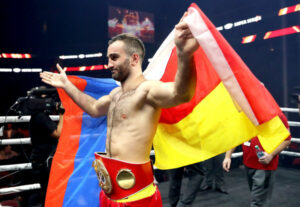
On Saturday 21st July, we will know who ‘the man’ is, along with the answers to the many other questions posed by this fascinating contrast in background and style. One thing is certain however: When Gassiev walks to the ring in the 80,000 maximum-capacity Olimpiskiy Arena in Moscow on Saturday evening, the Russian flag and the backing of an entire nation behind him.
It will be a world away from his first taste of combat on the mean streets of Vladikavkaz. The Caucasus man; the noble savage; come good.
Article by: Paul Lam
Follow Paul on Twitter at: @PaulTheWallLam
[Quotes courtesy of World Boxing Super Series]